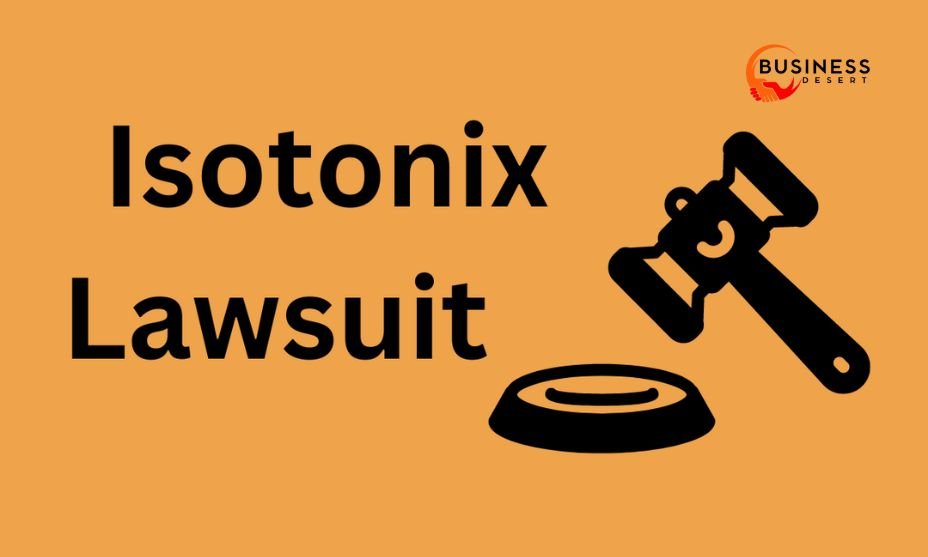Table of Contents
Introduction to the Isotonix Lawsuit
The Isotonix lawsuit refers to a series of legal challenges that Market America, the parent company of Isotonix, has faced over the years. Isotonix, known for its line of dietary supplements, has attracted significant attention due to claims about its product quality, business practices, and marketing strategies. These legal challenges, ranging from FDA warnings to pyramid scheme allegations, have impacted Market America’s reputation, raising questions among consumers and industry observers alike.
Market America’s Isotonix line promises innovative products with a unique delivery method intended to optimize nutrient absorption. However, these promises have led to scrutiny, with regulatory bodies like the FDA investigating product claims and warning the company about compliance issues. Furthermore, the company’s multi-level marketing model has brought its business practices into question, with critics alleging that it may prioritize recruiting over product sales.
For consumers, the Isotonix lawsuit has implications beyond legal boundaries. It highlights the need for transparency in the dietary supplement industry and raises important questions about how such products are marketed and regulated. In this article, we’ll explore the Isotonix lawsuit, its implications, and what consumers should be aware of to make informed decisions.
Background of Isotonix and Market America
1.1 What is Isotonix?
Isotonix is a line of dietary supplements marketed by Market America, featuring a unique powder-based formula that dissolves in water, claiming to provide a more efficient nutrient delivery method. The name “Isotonix” comes from the word “isotonic,” which means the same pressure as bodily fluids, allowing nutrients to be absorbed more effectively. Market America promotes these supplements as beneficial for various health needs, including energy, digestion, immune support, and more. This approach to nutrient delivery is central to the brand’s marketing strategy, suggesting that the isotonic form can optimize absorption, leading to faster and more noticeable benefits. However, this unique formulation has also led to increased scrutiny, as consumers and regulatory bodies question the validity of these claims and the product’s overall effectiveness.
1.2 Who is Market America?
Market America is a U.S.-based company founded in 1992 by entrepreneur J.R. Ridinger, specializing in a wide range of products, including wellness, skincare, and household items, but most notably, Isotonix supplements. The company operates as a multi-level marketing (MLM) company, which means distributors earn not only from product sales but also by recruiting new distributors. This business model is central to Market America’s expansion strategy, allowing them to leverage a large network of distributors and build consumer trust through personal connections. However, the MLM structure has raised concerns among consumer advocates and regulatory bodies, leading to allegations of it functioning as a pyramid scheme. Despite these controversies, Market America has grown into a global company, attracting customers and distributors worldwide, though not without criticism of its business practices.
Legal Challenges Faced by Market America
2.1 FDA Warning Letters
Market America received several warning letters from the Food and Drug Administration (FDA) related to its Isotonix products, mainly due to claims about their benefits that were not backed by scientific evidence. The FDA identified issues such as mislabeling, with Isotonix products described as treatments or cures for specific health conditions without the required approvals. For example, Isotonix has made claims about improving energy levels and immunity, but without clear, substantiated evidence to meet FDA standards, these claims are deemed misleading. The FDA’s warnings are a serious matter, as companies in the supplement industry are expected to adhere strictly to regulations. This warning sheds light on broader issues in the industry, where many supplements make health-related claims that may not be fully supported by scientific research or regulatory approval.
2.2 Pyramid Scheme Allegations
Market America’s MLM business model has led to allegations of operating a pyramid scheme rather than a legitimate product-selling enterprise. Unlike traditional retail businesses, MLMs rely heavily on recruiting new distributors to drive revenue, which can sometimes overshadow the focus on selling products to end consumers. Critics argue that Market America’s business model prioritizes recruitment over product sales, creating an environment where only those at the top of the hierarchy can earn substantial income. This structure has led to several lawsuits, with plaintiffs claiming they experienced financial losses due to high distributor fees and an unsustainable income model. These allegations bring into question the ethics of MLM business structures and highlight potential risks for individuals considering joining MLM companies as distributors.
2.3 Deceptive Income Claims
Market America has also faced allegations of deceptive income claims, with claims that distributors could earn significant income despite evidence suggesting that only a small percentage make meaningful earnings. Various reports have surfaced alleging that Market America used marketing materials and testimonies to promise high earnings, a common attraction in MLMs that target those seeking financial freedom. However, the reality for most distributors reportedly fell far short, with many finding it difficult to recover their initial investments. Investigations from organizations like Truth in Advertising (TINA.org) further suggested that the company used testimonials and lifestyle imagery to project a financially successful image that was largely unattainable for average distributors. These allegations highlight the importance of transparency in income claims for MLM companies, as misleading income projections can cause financial harm to new recruits.
2.4 Trademark Infringement Lawsuit
In 2019, Market America faced a trademark infringement lawsuit from a competitor, accusing the company of using a name and logo that closely resembled that of another brand. The competitor claimed that this resemblance caused confusion among consumers and harmed their business. Trademark laws exist to prevent companies from copying distinctive names or logos of other brands, as this can mislead customers and unfairly impact competitors. This lawsuit added another layer to Market America’s legal issues, pointing to the competitive and sometimes contentious environment in the dietary supplement industry. Such cases emphasize the importance of originality and respect for intellectual property rights, as using similar branding to another established company can have legal and reputational repercussions.
Implications of the Isotonix Lawsuit
3.1 Impact on Consumers
The Isotonix lawsuit has significant implications for consumers, primarily raising concerns about product quality and the reliability of marketing claims. With the scrutiny over Isotonix’s health benefits and income promises for distributors, potential customers and recruits may now question the accuracy and transparency of the company’s claims. For consumers, this serves as a reminder to approach health supplements with caution, considering regulatory oversight and scientific evidence supporting any claims. Such lawsuits often impact brand loyalty, as consumers become more aware of the company’s legal history, especially if the allegations reflect poorly on product quality or integrity. Additionally, these cases emphasize the importance of regulatory compliance and truthful advertising in the supplement industry.
3.2 Effects on the Dietary Supplement Industry
The ongoing Isotonix lawsuit and similar cases have broader implications for the dietary supplement industry, spotlighting the need for higher standards in product testing, regulatory compliance, and honest advertising. Market America’s legal troubles have fueled conversations about the risks associated with MLMs in the supplement market and the often vague guidelines surrounding health-related claims. With more scrutiny, regulatory agencies like the FDA may intensify efforts to monitor companies making unverified health claims, leading to stricter rules and enforcement. The lawsuit serves as a reminder that dietary supplements are often minimally regulated, putting greater responsibility on companies to ensure the safety and efficacy of their products and on consumers to critically evaluate such products.
3.3 Market America’s Response
In response to these legal challenges, Market America has made efforts to address regulatory concerns, stating a commitment to compliance and transparency. The company has reportedly taken measures to revise marketing materials, ensure accurate product descriptions, and improve income projections for distributors. Market America’s public statements emphasize a dedication to regulatory standards, with an assurance to consumers and distributors that they are taking necessary steps to address the issues raised. However, as legal proceedings continue, these efforts will be closely scrutinized to determine whether the company has truly reformed its practices or if the changes are primarily surface-level adjustments to ease regulatory pressure.
What Consumers Should Know
4.1 Evaluating Dietary Supplements
Consumers looking to evaluate dietary supplements like Isotonix should consider factors such as ingredient transparency, scientific backing, and regulatory compliance. Unlike prescription medications, dietary supplements are not subjected to the same rigorous testing, which makes it essential for consumers to research ingredients and consult healthcare professionals when in doubt. It’s helpful to look for supplements that are third-party tested, meaning they’ve been assessed by an independent organization for quality and safety. Additionally, consumers should pay attention to the claims made on product labels and question overly ambitious health promises. By doing so, they can make more informed choices and minimize the risks associated with supplements.
4.2 Understanding Multi-Level Marketing (MLM) Models
For those considering joining Market America or similar MLM companies, it’s crucial to understand how multi-level marketing works and the risks it may pose. MLMs, unlike traditional businesses, rely on recruitment as a primary source of income, which can sometimes create financial strain on new recruits who struggle to achieve promised income levels. Prospective distributors should consider all potential costs, including starter fees, training materials, and minimum product purchases. Additionally, they should research the success rate among distributors to get a realistic idea of potential earnings. By understanding the MLM model, individuals can make better-informed decisions about whether this type of business aligns with their goals and financial expectations.
4.3 Staying Informed
Staying informed is a key takeaway for any consumer or prospective distributor in today’s supplement and MLM industries. Legal challenges like the Isotonix lawsuit underscore the importance of researching brands, examining regulatory warnings, and looking into any legal disputes a company may face. Consumers can follow updates on Market America’s legal status through official regulatory channels, as well as independent consumer advocacy organizations that monitor MLM practices. Staying informed about these issues helps consumers navigate the market with greater awareness, making decisions that are better aligned with their health and financial interests.
Conclusion
In conclusion, the Isotonix lawsuit represents a complex case involving legal, regulatory, and ethical concerns. From FDA warnings and pyramid scheme allegations to deceptive income claims and trademark infringement, Market America’s challenges highlight the need for transparency and regulatory compliance in the dietary supplement and MLM industries. For consumers, these cases serve as a reminder to approach supplements with caution, verify company claims, and understand the risks associated with multi-level marketing models. By staying informed and critically assessing brands, consumers can make choices that support their health and financial well-being while navigating an industry often marked by both innovation and controversy.
For More Visit : Businessdesert







